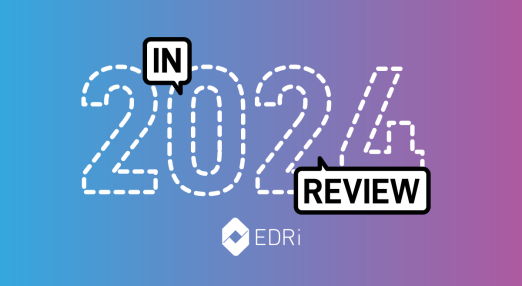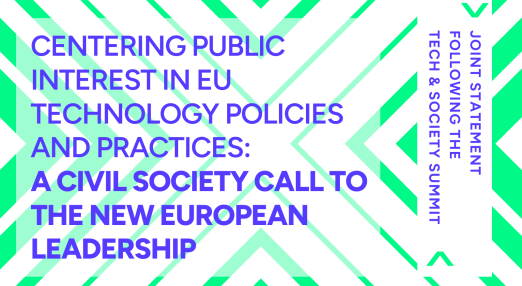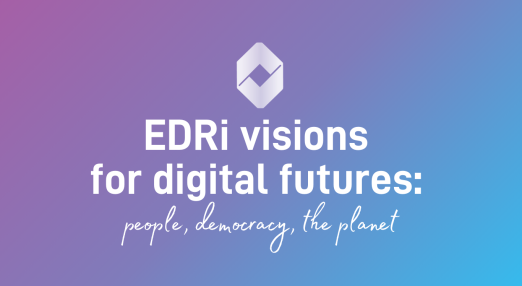Information democracy
Powerful companies and governments control the way the internet and new technologies are deployed. These actors blur the lines on corporate power in ways that have tremendous impact on people and democracies. The dominant business model of ‘Big tech’ platforms is based on surveillance, polarization and power imbalances. This ‘surveillance capitalism’ has had a global impact on democracy. For example, state and private actors can use the internet and technologies to spread political disinformation, to manipulate electoral results, to attack human rights defenders and to limit civic space.
Filter resources
-

Chaos Computer Club supports hackers facing legal battle with railway manufacturer
Three ethical hackers were targeted by Polish railway manufacturer Newag after exposing anti-competitive practices. EDRi member Chaos Computer Club is backing the researchers to ensure they can continue their vital work without fear of legal retaliation.
Read more
-

EDRi-gram, 5 February 2025
What has the EDRis network been up to over the past two weeks? Find out the latest digital rights news in our bi-weekly newsletter. In this edition: Don’t let Big Tech bully the EU, Commission’s AI Act guidelines should center human rights, & more!
Read more
-

Exploring the aftermath of the annulment of Romanian election results – social media platforms, the democratic process, and the role of the DSA
EDRi member ApTI recaps events leading up to and after the annulment of the December 2024 result of the first round of Presidential elections in Romania. Investigations confirm TikTok’s failure to follow European and national electoral law. With the elections set to take place again later this year, ApTI explores the relationship between the discourse on social media platforms, the democratic process and how legislation such as the DSA can act as a safeguard.
Read more
-

EDRi-gram, 22 January 2025
The EDRi-gram is back after the winter break and yes, we missed you too. Before we dive into the new year, we have a review of 2024 for you. From stopping Chat Control to hosting the first-ever Tech and Society Summit, read up on what kept EDRi so busy last year. In this edition, also catch-up with some important developments from the end of 2024 which are bound to pop up again on the digital rights radar soon. The infamous High Level Group Going Dark presented their "insecurity by design agenda". So don’t be surprised if EU politics sees another iteration of flawed proposals on data retention and circumventing encryption. Ugh. Meanwhile, the European Commission presented their proposal for digitalising travel documents. “Didn’t they promise that for the third quarter of 2023,” you say? Indeed, but after the initiative received a devastating amount of negative feedback, it took more than a year for the adjusted EU travel app proposal. We provide an extensive analysis of the (so far) voluntary system for pre-travel controls. For our more masochistically inclined readers, we take a look over to the US and how corporate social media such as Meta and X align with the new administration. Recent changes to content moderation policies empower far-right extremists and expose marginalised and minoritised communities to hate speech.
Read more
-

A new tool helps Slovenian public identify AI-generated content and educates about its risks
EDRi affiliate Danes je nov dan recently launched Razkrinkaj.ai – an online tool that allows users to test their ability to recognise AI-generated content through an interactive quiz while learning about the risks and challenges associated with it.
Read more
-

Meta and X are going rogue. Here is what Europe should do now.
With Elon Musk, Mark Zuckerberg, Jeff Bezos and many other tech billionaires cuddling up to an ever more authoritarian Trump administration, it is crucial that the EU sticks to stringent enforcement of its tech laws. However, to solve the core problem, we have to curb the immense grip Big Tech has on our institutions and invest in truly independent digital alternatives.
Read more
-

EDRi’s 2024 in Review
As we enter 2025, we look back on some of the biggest European digital rights developments, the laws passed, enforcement actions taken, and things to watch out for in the new year and the new EU mandate.
Read more
-

Dear Claire
With your decision to step down as EDRi's Executive Director in the summer of 2025, we celebrate your remarkable leadership during the past seven years. Your vision, resilience, and commitment to digital rights have shaped EDRi into the robust and well established network organisation it is today.
Read more
-

EDRi-gram, 4 December 2024
This week, a new college of European Commissioners was confirmed by the European Parliament. Together with a broad civil society coalition, we welcomed them with our collective vision for EU policy that puts technology in the public interest. This call-to-action for the new leadership is crucial, given the worrying Commissioners' hearings in the European Parliament. Their focus on corporate and security interests steeped in, wrapped in a harmful logic of constant growth and control. Below, you can also read our main takeaways from the Commissioners' hearings. It was a mixed bag that reiterated the importance of our efforts towards achieving digital justice. More, we share a critical analysis of the EU's twin transition in times of crises, and its connection to green extractivism and militarisation. Romania has also been on our minds this week – with an unexpected extremist candidate winning the first round of the presidential elections. Civil society in Romania is ringing the alarm about the role that TikTok played in amplifying an existing democracy deficit and social issues, how the tech platform relates to DSA obligations, and what the EU and national authorities can do about it. Finally, EDRi's Executive Director Claire Fernandez is preparing for a leadership transition in 2025. Join us in thanking Claire for her dedication and impact, while reading some reflections below.
Read more
-

Centering public interest in EU technology policies and practices: A civil society call to the new European leadership
Read the joint statement of civil society organisations following the Tech & Society Summit (1st October, Brussels).
Read more
-

EDRi-gram, 20 November 2024
For the last two weeks, we’ve been tuning in to the European Commissioner-designates’ hearings in the European Parliament to hear how would-be EU decision-makers in the Commission envision the role of technology in our future. Some hearings were riveting, while others deeply worrying. It was encouraging to hear that the enforcement of existing digital laws like the GDPR and DSA was high on some Commissioner-designates’ priorities. However, there were also many disturbing mentions of tech hype buzzwords, and no strong commitments to tackle surveillance or protect our right to safe and confidential communications online through encryption. This month, our neighbours across the Atlantic have been reeling from the results of their Presidential election. However, we’re worried about more than just that when it comes to the US. A decade after Snowden’s revelations, and despite continuing privacy concerns, surveillance and mass data collection continue under the EU-US Data Privacy Framework. And the EU appears to be willing to compromise our rights for geopolitical and economic gains.
Read more
-

Building technology by, for, and of the people: A vision for our digital future
Together, we can protect human rights, strengthen democracy, and reshape societal systems. Read about our commitment to prioritising building technology by, for, and of the people, as part of our Vision for 2024 and beyond.
Read more
